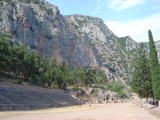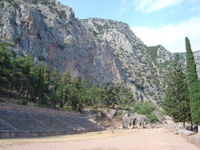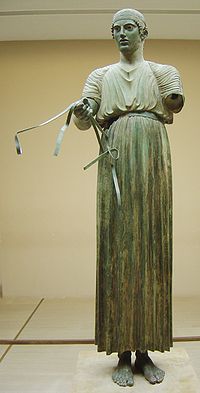
Pythian Games
Encyclopedia


Panhellenic Games
Panhellenic Games is the collective term for four separate sports festivals held in ancient Greece. The four Games were:-Description:The Games took place in a four-year cycle known as the Olympiad, which was one of the ways the Greeks measured time...
of Ancient Greece
Ancient Greece
Ancient Greece is a civilization belonging to a period of Greek history that lasted from the Archaic period of the 8th to 6th centuries BC to the end of antiquity. Immediately following this period was the beginning of the Early Middle Ages and the Byzantine era. Included in Ancient Greece is the...
, a forerunner of the modern Olympic Games
Olympic Games
The Olympic Games is a major international event featuring summer and winter sports, in which thousands of athletes participate in a variety of competitions. The Olympic Games have come to be regarded as the world’s foremost sports competition where more than 200 nations participate...
, held every four years at the sanctuary of Apollo
Apollo
Apollo is one of the most important and complex of the Olympian deities in Greek and Roman mythology...
at Delphi
Delphi
Delphi is both an archaeological site and a modern town in Greece on the south-western spur of Mount Parnassus in the valley of Phocis.In Greek mythology, Delphi was the site of the Delphic oracle, the most important oracle in the classical Greek world, and a major site for the worship of the god...
.
They were held in honour of Apollo
Apollo
Apollo is one of the most important and complex of the Olympian deities in Greek and Roman mythology...
two years after (and two years before) each Olympic Games, and between each Nemean
Nemean Games
The Nemean Games were one of the four Panhellenic Games of Ancient Greece, and were held at Nemea every two years ....
and Isthmian Games
Isthmian Games
The Isthmian Games or Isthmia were one of the Panhellenic Games of Ancient Greece, and were named after the isthmus of Corinth, where they were held...
. They were founded sometime in the 6th century BCE, and, unlike the Olympic Games, also featured competitions for music and poetry. The music and poetry competitions pre-dated the athletic portion of the games, and were said to have been started by Apollo after he killed Python
Python (mythology)
In Greek mythology, Python was the earth-dragon of Delphi, always represented in Greek sculpture and vase-paintings as a serpent. He presided at the Delphic oracle, which existed in the cult center for his mother, Gaia, "Earth," Pytho being the place name that was substituted for the earlier Krisa...
and set up the oracle at Delphi. Otherwise, the athletic events were the same as the Olympic Games. A four-horse chariot race
Chariot racing
Chariot racing was one of the most popular ancient Greek, Roman and Byzantine sports. Chariot racing was often dangerous to both driver and horse as they frequently suffered serious injury and even death, but generated strong spectator enthusiasm...
was held in a hippodrome
Hippodrome
A hippodrome was a Greek stadium for horse racing and chariot racing. The name is derived from the Greek words "hippos and "dromos"...
in the plain, not far from the sea, in the place where the original stadium was sited. (ref: Pindar
Pindar
Pindar , was an Ancient Greek lyric poet. Of the canonical nine lyric poets of ancient Greece, his work is the best preserved. Quintilian described him as "by far the greatest of the nine lyric poets, in virtue of his inspired magnificence, the beauty of his thoughts and figures, the rich...
)
According to Ovid, in the formative years of growth after the deluge, mother earth accidentally produced a gigantic Python that terrorized the humans. Apollo successfully killed it, though it required almost every arrow from his quiver. To ensure that no one forgot about this heroic deed, he created the Pythian games to commemorate his victory.
The winners received a wreath of bay laurel
Bay Laurel
The bay laurel , also known as sweet bay, bay tree, true laurel, Grecian laurel, laurel tree, or simply laurel, is an aromatic evergreen tree or large shrub with green, glossy leaves, native to the Mediterranean region. It is the source of the bay leaf used in cooking...
, sacred to Apollo, from the city of Tempe
Vale of Tempe
The Vale of Tempe is a gorge in northern Thessaly, Greece, located between Olympus to the north and Ossa to the south. The valley is 10 kilometers long and as narrow as 25 meters in places, with cliffs nearly 500 meters high, and through it flows the Pineios River on its way to the Aegean Sea...
, in Thessaly
Thessaly
Thessaly is a traditional geographical region and an administrative region of Greece, comprising most of the ancient region of the same name. Before the Greek Dark Ages, Thessaly was known as Aeolia, and appears thus in Homer's Odyssey....
. Smaller versions of the Pythian Games were celebrated in many other cities of the Levant
Levant
The Levant or ) is the geographic region and culture zone of the "eastern Mediterranean littoral between Anatolia and Egypt" . The Levant includes most of modern Lebanon, Syria, Jordan, Israel, the Palestinian territories, and sometimes parts of Turkey and Iraq, and corresponds roughly to the...
and Greece.
History

In the beginning only musical contests were held in the Pythian Games then extended by singing to guitar performances. These retained great importance as also in the other big Festivals, although with the new rearrangement of the Pythian even the gymnastic competitions and the chariot racing and horse riding found its introduction to the games.
During the Delphic Games, which lasted three months, the Holy Delphic Peace was announced. The ceasefire guaranteed the people – participants and spectators – to travel without risk to the Games and back to their homeland. The enthusiasm of the public is bequeathed. Scores of people flock out of entire Greece, bringing in substantial revenue to the city. The Agora, the Market took place during the Games, and became a very important significant emporium for the Arts.
In 394 CE Theodosius I
Theodosius I
Theodosius I , also known as Theodosius the Great, was Roman Emperor from 379 to 395. Theodosius was the last emperor to rule over both the eastern and the western halves of the Roman Empire. During his reign, the Goths secured control of Illyricum after the Gothic War, establishing their homeland...
, the Christian Roman Emperor
Roman Emperor
The Roman emperor was the ruler of the Roman State during the imperial period . The Romans had no single term for the office although at any given time, a given title was associated with the emperor...
(the seat of the Roman Empire
Roman Empire
The Roman Empire was the post-Republican period of the ancient Roman civilization, characterised by an autocratic form of government and large territorial holdings in Europe and around the Mediterranean....
was by then Constantinople
Constantinople
Constantinople was the capital of the Roman, Eastern Roman, Byzantine, Latin, and Ottoman Empires. Throughout most of the Middle Ages, Constantinople was Europe's largest and wealthiest city.-Names:...
, formerly Byzantium
Byzantium
Byzantium was an ancient Greek city, founded by Greek colonists from Megara in 667 BC and named after their king Byzas . The name Byzantium is a Latinization of the original name Byzantion...
), banned the Delphic Games because it was not Christian.
Course
Unfortunately the testimonials and documents covering the Delphic Games were mainly destroyed through human violence and natural catastrophes. All the remaining resources highlight the glory and glamour of the Games. The records of Aristoteles present an overview about the festivities: the Games lasted for six to eight days and were started by a Holy Game, which showcased the victory of Apollo over Python. In a festive and glamorous Procession a “Festival Sacrifice” was performed in the Temple of the Apollo. After four days of festivities the Games began.The Music and Theatre Play competition were carried out in the Theatre, the athletic contests in the Stadium of Delphi. The chariot races were carried out in the nearby plain of Krisa, taking into account the hilly landscape of Delphi.
The musical disciplines included:
- One Hymn addressed to the Apollo God
- Flute and Kithara (an old Greek string instrument) with or without singing
- Acting and Dance Competitions
- Painting Competitions
The Delphic Games were honorary Games. The winners did not receive any prize money, but a Laurel Twig as award, because the laurel was very sacred to Apollo. Twig as the Olympian award. Even apples were sometimes presented as competitive prize and the winner received the symbolic Palm Twig at the Pythian and also at the Olympian Games. As special honour and tributes also a statue was dedicated to the competitors. However, the reputation the winner received by his city was priceless. The cities used all available resources to support their athletes.
See also
- International Delphic CouncilInternational Delphic Councilthumb|200 px|[[Delphi]], the ruins of the [[Apollo]] Temple, in whose honor the [[Pythian Games]] were heldthumb|200 px|[[Castalian Spring]] at the foot of the mountain [[Mount Parnassus]] in [[Delphi]]. In ancient times, this spring was to [[Apollo]]n and [[Muse]] dedicatedthumb|200...
- International Delphic CommitteeInternational Delphic CommitteeInternational Delphic Committee is the organization which prepares and holds the modern Delphic Games is the International Delphic Committee, which headquarters is located in Russia...
- Delphic Games of the modern eraDelphic Games of the modern eraThe Delphic Games of the modern era involve presentations, exhibitions, competitions and other activities in six different fields of art . These games unite people of all nations and cultures through their fascination for the arts and have their origins in the ancient Greece.- Historical reference...

